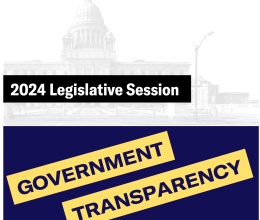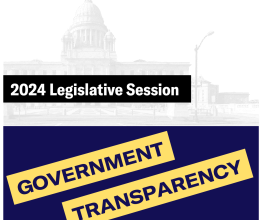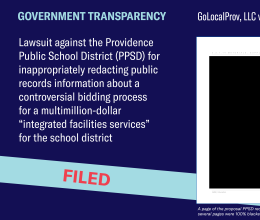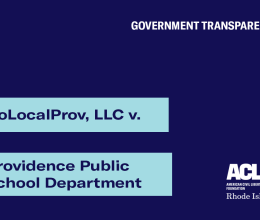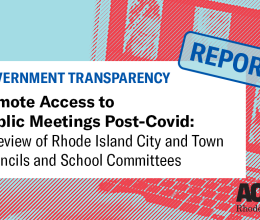As noted earlier, the Affiliate lobbies on more than one hundred pieces of legislation each session, so the newsletter can only highlight a small percentage of our activities. In order to give members a more in-depth sense of the Affiliate’s legislative work, we have picked one topic – open government – and briefly summarize below how the ACLU helped shape a variety of pieces of legislation, both large and small, on the issue this session.
- Following harsh criticism from the ACLU about an Attorney General opinion holding that the open meetings law allows telephone meetings by public bodies, the General Assembly passed a bill overturning that ruling. As originally introduced, however, the bill contained an exemption that would have allowed phone meetings for members of public bodies residing on Block Island. The Affiliate convinced the bill’s sponsors to remove that exemption. (Regrettably, legislators later added another one – though admittedly small – for people serving in the military.)
- When the General Assembly was on the verge of passing a “jobs growth” bill designed specifically to provide a tax break to executives at Fidelity Investments (but potentially available to other businesses as well), the ACLU objected to language that made confidential the entire eligibility and application process for companies seeking the tax break. In response, the bill was amended to make public some of the application information which raised no legitimate privacy concerns.
- Nursing home reform was at the top of the General Assembly’s agenda this year. As originally introduced, reform legislation kept strictly confidential any information obtained by the Department of Health regarding a significant change in a nursing home’s financial condition. While acknowledging that much of the financial information provided to the Department might be proprietary, the ACLU objected that the bill made the very fact of a dangerous change in financial conditions – a change that could easily and severely impact residents’ welfare – confidential. That provision and similar sections of the bills were changed to address the ACLU’s “right to know” concerns.
- When the House of Representatives proposed its rules of procedures for the new session in February, the ACLU was very concerned about some of the provisions. One proposed rule barred any photographic or video recording of House sessions or committee meetings without permission and another made committee votes on bills available to the public only upon written request – a new, unnecessary and burdensome requirement in conflict with the state’s open records law. Both provisions were removed after the ACLU objected.
- In opposing the “red light camera” bill, the Affiliate successfully pushed for an amendment that replaced confidentiality language with a provision ensuring that aggregate data about violations and an annual report analyzing the efficacy of the technology will be public information.
- A bill establishing a pilot program for the redistribution of unused prescription drugs to indigents was amended, at the ACLU’s suggestion, to require the Department of Health to seek public input before adopting regulations implementing the new program.

